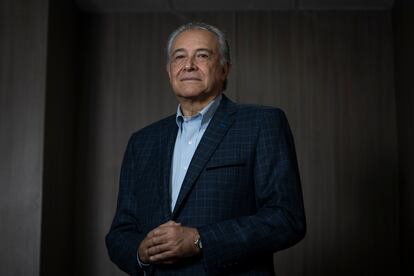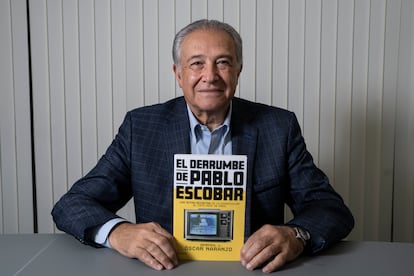Óscar Naranjo: ‘Pablo Escobar installed the idea that killing is legitimate if it solves a problem’
The renowned general was part of the siege that resulted in the drug capo’s death and subsequently, as police commander, he sought to confront the legacy of the most notorious narco in Colombia’s history


Óscar Naranjo Trujillo (Bogotá, 66 years old) is one of Colombia’s best-known police officers. Not only was he police commander in Álvaro Uribe’s government, but he also served as vice president under Juan Manuel Santos between 2017 and 2018. Before all of this, before the limelight, he was one of the central members of the final pursuit of Pablo Escobar, as one of the intelligence experts of the so-called Search Bloc.
Thirty years after the capo’s death, he has written El derrumbe de Pablo Escobar (The fall of Pablo Escobar), an account of how the state managed to overthrow the narco boss it confronted, who left tens of thousands of victims. He told EL PAÍS in the north of Bogotá that he firmly believes it is impossible to think about Escobar without focusing on his victims.
Question. You have just published a book about the operation that resulted in the death of Pablo Escobar 30 years ago. Why now?
Answer. I wrote this book thinking of Pablo Escobar’s victims, of whom there are thousands and who have become anonymous during all these years. The country has embarked on a process of reparations to the victims. Thank God we are working for truth, for justice. However, little has been said about the victims of drug trafficking.
Q. You also talk about the key players in the capo’s entrapment.
A. Yes, after 30 years, people remember Escobar and not people like General Hugo Martínez Poveda, who was the architect of the fight to neutralize him. Nor Jaime Ramirez Gomez, who delivered the first structural blow against drug trafficking, in Tranquilandia. Nor Valdemar Franklin Quintero, who was murdered on the same day as Luis Carlos Galán.
The idea, rather than just talking about Pablo Escobar, is to put this history into context and offer some reflections. It would appear that in these 30 years we have been on a stationary bicycle: drug trafficking continues to cause damage in spite of the prohibitionist policy. Consumption, production, violence and corruption have all increased. Democratic ungovernability is now on the rise, as drug trafficking structures exert a kind of criminal governance in parts of Colombia and Latin America.
Q. A rather bleak scenario...
A. It is a bleak picture, but one that should not be ignored. The world should be motivated to widen the debate. As the U.S. government mentioned in the latest cooperation document with Colombia, this problem needs to be addressed holistically.
Q. What was Escobar looking for with a narco-state?
A. When I approached him as a target to be brought to justice, I discovered that he was a criminal who not only sought to profit from drug trafficking, but he also harbored a political appetite. There is nothing more dangerous than a criminal who wants to enter politics. That’s what he did, he was an alternate representative to the House of Representatives for Antioquia, he made it to the Congress of the Republic. His goal was to lead this country into a narco-state. That became clear when the narcos managed to summon a former president, Alfonso Lopez, and Attorney General Carlos Jimenez Gomez to a meeting in Panama. They offered to pay the foreign debt. It was blackmail to buy Colombians.
Q. The book recounts that Escobar escalated violence by attacking the families of his persecutors.
A. Pablo Escobar was a disruptive criminal. There was an unspoken rule between criminal and authority, so the families of the officials were safe from confrontation. But he broke this, threatening the families of those who persecuted him and this has not been overcome. There are organizations that target families. In 2007, I had to take one of my daughters out of Colombia because a plan, not a threat, by the North Valley Cartel to kidnap and disappear her was discovered. The seed that Escobar sowed is still alive. Pablo left a damaging legacy: he installed among Colombians the idea that killing is legitimate if it solves a problem.
Q. The book points out that Escobar is a popular figure among some people.
A. There are two dimensions to this issue. One is emotional, it is the tremendous bewilderment when you see a young man in a street in Rome, Madrid or London wearing a T-shirt with his image on it, you feel sadness because that young man was manipulated by a narrative that distorted reality. What does he think Pablo Escobar was, a benefactor, a criminal, a murderer?
From a rational, cognitive point of view, in Colombia we are experiencing a cultural deficit because the narrative of the drug traffickers has been imposed — a process they promote in order to legitimize themselves. A society should not only entrench itself in criminal justice to bring about sanctions. It must develop a cultural movement that strengthens democratic values and principles. Culture tends to recreate episodes that impact society. Our problem is that much of the literature on drug trafficking originates from former drug traffickers. We are missing an external look, we need a Colombian Mario Puzo.

Q. Is that because drug trafficking is still present?
A. It is still present, but in a much more difficult to understand way. They are no longer organizations headed by well-defined figures; the command and control is unclear. There are three levels: those who are in the operation of drug trafficking, those who form the private armies of drug trafficking, and those who profit from drug trafficking and are in an invisible comfort zone. These are money launderers or financiers that no one pursues and move like a fish in water in society. In addition, the globalization of crime is a post-modern trait.
Q. It is often said that the Mexican cartels came to Colombia and replaced the Colombian ones.
A. There is a division of labor: those who produce, those who transport, those who distribute, those who launder the assets. However, the Mexican organizations are important. They have managed to subordinate Colombian organizations and those from other Latin American countries to become their suppliers.
Q. Does that change the fight against them?
A. The challenge is to see how the state competes with criminal organizations. Pablo’s challenge was direct, it was for the seizure of national power. Today the organizations compete in territories where the absence of the state is very evident and where the choices for the future of young people hinge on being recruited by these organizations.
For this challenge, the 2016 peace agreement opened some roads, and much of this recipe lies in implementing it. For example, the comprehensive rural reform is aimed at transforming life in the territories, so that the state becomes an ally and a guarantor of rights and freedoms. This includes progress in crop substitution, accrediting land ownership, in the local infrastructure required to generate housing, education and conditions for the formal economy to grow. While this does not happen, the illegal economy will continue to prevail.
Q. When a state faces a challenge like Pablo Escobar and overcomes it, it usually reinforces some of its capacities, did that happen in Colombia?
A. Against organized crime, in conventional terms, Colombian institutions today are very competitive and capable. It is sufficient to recall how the criminal institution judges, who were responsible for issuing arrest warrants or search warrants to the cartel, operated under staircases in old public buildings. Today there is a Prosecutor’s Office that, despite all its flaws, is probably the most powerful in Latin America regarding its investigative and prosecutorial capabilities. Or the police, which back then had three or six helicopters, today has dozens.
Q. And what is missing?
A. The most difficult thing is to change the vision. In a guerrilla war, like the one Colombia experienced, territory is a factor of weakness, because whoever remains static is annihilated. When the peace agreement was signed, that logic is not transformed to make territorial control permanent. We have capabilities that have not adapted to this new reality. The big operations against drug trafficking come from the central level: Prosecutor’s Offices, police, military, they arrive at a place, confiscate or capture, and leave.
We are suffering from an inability to adapt to new realities. For instance, while in the world —especially in the United States — there is an increasingly flexible regulation of marijuana consumption, in Colombia we have been incapable of transforming the territories where there is marijuana.
Q. When Pablo Escobar was the threat, we knew who the enemy was, what his source of financing was, what his bases were. Today this is more scattered. Is there a lack of capacity to adapt?
A. It is more complex today. The problem requires bringing together state institutions with academia, communities, intelligence and international cooperation to understand what is happening. Usually, there is a simplification in the diagnosis. It is believed that a criminal gang operating in Catatumbo is the same as one operating in Putumayo, but it turns out that the mentality is different, the motives are different, the incentives are different, the conditions are different. However, the institutional recipe has to be national.
Q. Does defeating Pablo Escobar give you the hope that you can repeat your success against these complex challenges?
A. Yes, just as there is a cursed bequest from Pablo, there are also some lessons learned. The successful ones are, first, the need for political determination. It is essential for there to be a political leadership that has a minimum consensus to tackle the problem. We would like it to be totally clear in the fight against poverty or crime. The second is the need for institutions that respond to this political determination and understand that the end does not justify the means. Political will needs to be based on respect for human rights as a bedrock. Thinking that the end is achieved by justifying the means causes enormous damage. The third is the need for citizen participation to accompany this political will. Finally, we need the capacity for scrutiny, oversight and supervision in order to correct errors.
Those lessons are there, but Colombia cannot solve this problem alone. International cooperation is required. It is necessary to know who the strategic allies are that accompany the fight, which, in the case of drug trafficking, have been the United Kingdom and, especially, the United States. After the murder of the minister Rodrigo Lara Bonilla, when we made an inventory of the armored cars the state had, there were six or seven of them. A few weeks later, the American cooperation sent us a fleet of 30 or 50 to protect the most threatened individuals. That reflects a very closely engaged diplomacy with the allies.
Q. This anecdote also shows the change experienced in 40 years in society in general.
A. Yes, Colombia is very different from the Escobar period, in every sense. For instance, there were no models for financial control of money laundering. Legislation was minimal and the protocols that are imposed today did not exist. Colombian intelligence in the fight against crime has become one of the best in the world, with a capacity not only based on technology but also on human intelligence sources. That is how we reached the impenetrable FARC camps, with human sources and electronic intelligence verification afterwards.
Progress has been made. We should not be gloomy, but much more open in the debate on how to deal with these problems and be more proactive in the formulation of public policies. For example, the government has just issued the drug policy. The problem is how to make it happen. We Colombians are very good at inspiring, we write well, we make excellent laws, but we do not comply with them and we do not execute them. The peace agreement is a perfect example. It is catalogued as the most complete agreement to relinquish a guerrilla conflict, but the speed at which it is implemented is insufficient.
Q. Do you see other major risks?
A. The biggest problem is that some criminal economies seem to be protected, as is the case of illegal gold mining. It’s like in the 1970s or 1980s when it comes to money laundering, we have no tools. People buy and sell gold through official channels and we don’t know where it comes from. It has been impossible for governments to return to the situation when the Bank of the Republic was the only verifier of gold, which could accredit its origin. Today, it is bought by private individuals, transported, melted and so on.
Sign up for our weekly newsletter to get more English-language news coverage from EL PAÍS USA Edition
Tu suscripción se está usando en otro dispositivo
¿Quieres añadir otro usuario a tu suscripción?
Si continúas leyendo en este dispositivo, no se podrá leer en el otro.
FlechaTu suscripción se está usando en otro dispositivo y solo puedes acceder a EL PAÍS desde un dispositivo a la vez.
Si quieres compartir tu cuenta, cambia tu suscripción a la modalidad Premium, así podrás añadir otro usuario. Cada uno accederá con su propia cuenta de email, lo que os permitirá personalizar vuestra experiencia en EL PAÍS.
¿Tienes una suscripción de empresa? Accede aquí para contratar más cuentas.
En el caso de no saber quién está usando tu cuenta, te recomendamos cambiar tu contraseña aquí.
Si decides continuar compartiendo tu cuenta, este mensaje se mostrará en tu dispositivo y en el de la otra persona que está usando tu cuenta de forma indefinida, afectando a tu experiencia de lectura. Puedes consultar aquí los términos y condiciones de la suscripción digital.








































